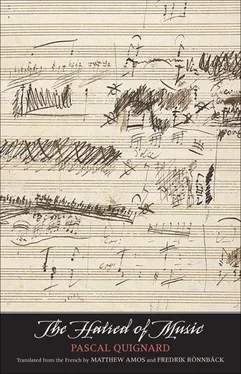
Light has its songs.
It is because of their cry that I like fires.
Whereas candlewicks crackled for centuries, electric wire buzzes.

Everywhere one finds this buzz specific to electric light in the world.
It is the “tonality” of the world.

Television programs are interested in writers like high-tension wires are interested in birds: that is, both by chance and in order to kill.

The human melody of northern Europe invisibly and continuously besieges every place where humans assemble, like the stridulation of cicadas summoning the summer long ago.
The birdcall song of the summer.
The solar tarabust.

Plato named them the Musicians. The ancient Greeks loved the singing of the cicadas so much that they would put them in cages and hang them in their house.

Tithonus, son of Laomedon, Priam’s older brother, was the most handsome man to be found on earth.
Aurora saw him. She took him. She loved him. She begged Zeus to grant immortality to her lover. Zeus granted it to the most handsome of men. But while formulating her request, in her haste, Aurora neglected to specify youth. Consequently, while his lover remained the same, Tithonus aged and shriveled. Aurora was forced to put him, like a gurgling baby, in a wicker basket. Then, when her very old lover was no larger than a finger, she transformed him into a cicada. Hanging him from a branch in a cage, she would watch her tiny husband, who would sing without end.
In the morning, as she was unable to satisfy her desire with the minuscule doll her husband had become, the goddess would cry. Aurora’s tears form dewdrops.

Leonidas of Tarentum, disciple of Epicurus, wrote:
At the end of the string hangs the worm, stretched
Toward the dark water. Like the sound of a harp
The string unravels. The bait is drier than a
Fly mummy in the hands of a spider.
Man, from dawn to dawn, of what reed are you the flute?

Frogs (the edible frog, rana esculenta ), our ancestors, used to live in stagnant water, or in rivers whose current is weak, perched in the sun on floating plants. I remember how pleasant it was.
Hoarse was the singing-bellowing of male frogs, in the wide croaking, the cracked mouths, and the inflation of their resonator sacs. Hoarse, in a word, the noisy coupling.
I understand why Spallanzani would dress male frogs in taffeta underpants every morning before beginning his decisive experiments on electricity.
It is the birdcall of rain.
Who does not enjoy eating sperma ranarum , which surpasses caviar in flavor?
Boars consume frogspawn as the greatest delicacy that the earth has to offer recluses.
The water rail prefers frogs themselves.
Ovid affirms that males, shouting their desire at their spouses in vain, tear their throats to the point of croaking. Ovid affirms that such was the origin of the male voice change, the females making themselves forever hoarse in a cry of refusal.

Trimalchio tells that he went to Cumae when he was a child. He saw the dried remains of the immortal Sibyl conserved in an urn suspended in the stone angle of the temple of Apollo.
Ritually, the children would walk forward in the shadow of the temple. They would suddenly cry out below the ampulla: “Sibyl, what do you wish?” A cavernous voice would come out of the urn, in the form of an echo out of the rocky angle, invariably responding: “I wish to die.”

This is song.
Apothanein thelō .

The ways of silence of the night.
Tymnes of Crete describes in a very short poem that he dedicates to a bird devoured by a raptor:
The trills and soft ornamentation of your breath
They went on the ways of silence of the night (
siōpèrai nyktos odoi
).

Silence is to ears what night is to eyes.

Two years after the hermit Xu You had refused to accept the empire from the emperor Yao, Xu You threw away the gourd that had been given to him in order to draw water. As he was asked why he had thrown it away, he responded:
“I can no longer bear the moaning of the wind that rushes into it when I hang the gourd from the branch of a tree.”
Several years later Xu You declared that to any music he preferred the sound of the hand that hung from the end of his arm for drawing water. He would bend his knees. He would arch his upper body over the bank. He would curl up his hand like a shell.

After Hans Andersen’s little Mermaid has given her voice to the witch, after she has become dead, become the foam of the waves, she mysteriously recovers it in order to say:
“Toward whom am I going?”

Ishtar took a harp and leaned on the rock before the sea.
Up came a great wave from the sea that stopped and said to him:
“For whom are you singing? Man is deaf.”

I no longer remember where I read the myth in which a mute man, seeing his mother in a dream, cannot communicate to her his distress.

I have let the strings on the cello loosen. I no longer climb up to the organ loft. I no longer direct the winds. I no longer sit before the yellow keyboards.
I have put down this book I am writing on the plastic armchair on which I had rested my feet and which I had placed before me on the grass. Now only my head is below the juniper.
Silence is a sort of deafening racket.
White, thick, slow, burning light has invaded my legs. The heat of the light is such that it covers them in water.
I move the plastic chairs back on the grass. Life is exhausting. My head turns, but it is true that I turn my head. The garden has fewer flowers.
The season progresses.
On the rosebushes along the old wall, the last flower heads are sprouting, but the leaves hanging on their branches are withered. The dense hazelnut tree at the bank’s edge is no longer intensely green: it has turned black. The river flows more slowly at its foot. One cannot even tell whether it is flowing. Neither its movement nor the wind creates the slightest wrinkle on its surface. One cannot even tell whether the sea still attracts the waters. Two very long white dead-nettles lean over the river. They stretch their faces toward their reflections glimmering in the black water. A dragonfly sits on the ring for the old scows. The word that designates them no longer carries even a memory of transport at the end of its chain. It was an old transport, a silent transport. The ducks are sleeping in a line along the dry grass that goes down to the river. Besides the honeysuckle under the porch (actually one can smell it only near the small house), there is not a single scent in the garden. One feels only the heat of one’s body. It is true that sometimes, once or twice an hour, from who knows where, there comes an odor of decay and almost of death. Nothing moves.
Читать дальше













